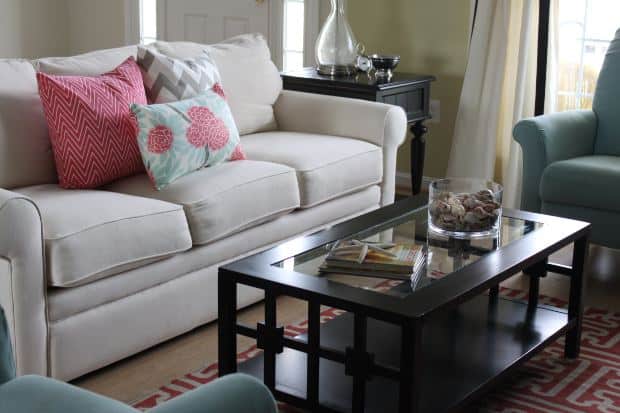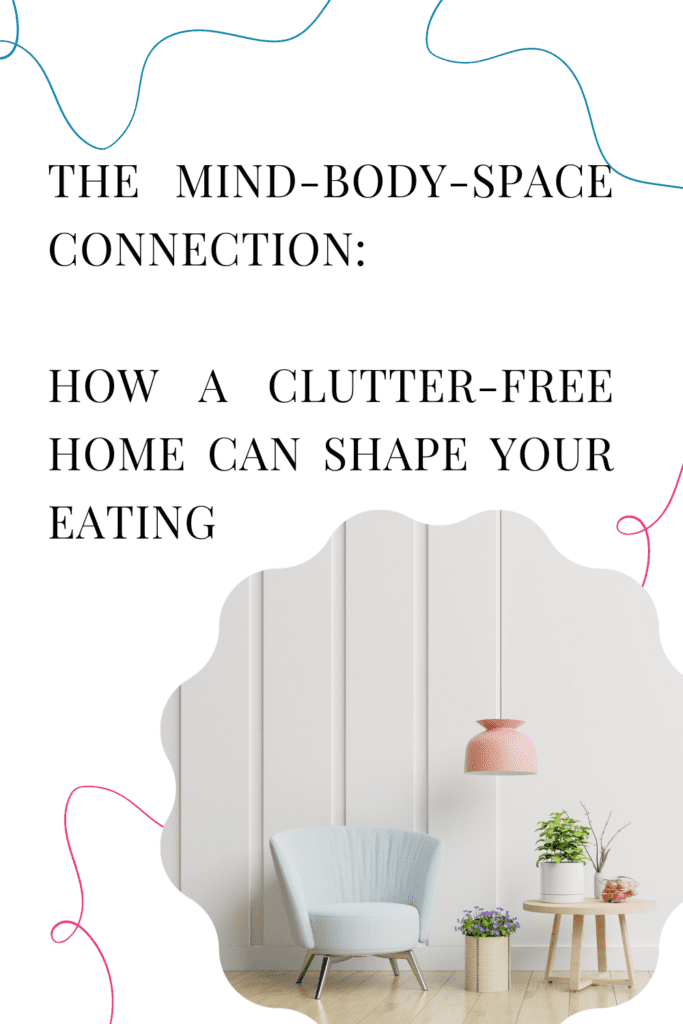The Mind-Body-Space Connection: How a Clutter-Free Home Can Shape Your Eating

As Within, So Without
My last post was about the impulse to fill emotional voids with the physical: be it food, shopping or not being able to let go of possessions we have acquired. In my experience, being able to let go of what no longer serves us is directly linked to being able to shift our relationship to food and weight-loss. Mindful eating and weight-loss is much more than calories, portion size or even quality of food; it is understanding what blocks we have in our life that are preventing the shifts we so desire. If we can’t declutter and clear our home of what no longer serves us, how on earth could we expect to discern what habits and relationships need to be cleared or transformed?
In the last year I have become increasingly conscious that my house is cluttered with objects. There is a principle in certain spiritual texts that goes, “As above, so below, as within, so without”. This same principle applies to our living space, our work space and all spaces in which we exist. The outside is a reflection of what’s going on in the inside. Likewise, what is going on inside, spills into our external world. How we behave, how we talk, how we eat, how we live, how we keep our house. This should not be taken as a judgment, but rather as an insight.
The Mind-Body-Space Connection
The current research on the mind-body connection has found that a relaxed body is a relaxed mind. When we exercise and get that euphoric sense of calm, we experience this truth: the body affects the mind. When we are depressed we experience fatigue, when we are anxious we have knots in our stomach and when we are angry our muscles tighten and our blood boils (blood pressure increases); the mind influences the body.
Let me extend the mind-body connection to what I like to call the mind-body-space connection. When our space is clear””our home, our office, our car””our mind naturally feels more calm and clear. This is the same when we are stressed; our mind and body (actions) influence our environment. We don’t place things where they belong, then they get lost and we don’t take the time to tidy because we believe we don’t have the time. This becomes a vicious circle because our cluttered, untidy environment makes us feel more stressed and well, you know, once that happens”“on and on it goes.
Stuff, Stuff Everywhere, but Nothing I Really Use
While my house was mostly tidy and would by no means qualify for the next episode of Hoarders, there is still far too much stuff for my liking. I admit, I want that house that my friend lives in. You know that friend. Everyone has one. Everything has a place and a purpose. Their house looks like a photograph from a zen version of “˜House and Home’. Instead I had stuff that is in random places, stuff that is mixed with other stuff that has no home, stuff that I don’t know where to store, stuff that is piled on other stuff and stuff that is hard to reach or find and then there’s the stuff that I’m not really sure of its purpose. So then how can I get rid of it? What if I need that unidentifiable stuff at some point?
After a colleague, (thanks Helen!), handed me her copy of Marie Kondo’s book, The Life Changing Magic of Tidying Up, I ran out of excuses to hang onto that stuff. The book gave me permission to let go of that sweater and skirt that I never wear, but felt guilty tossing because it was an expensive purchase. There’s also those objects, books and clothes that used to bring joy, that I used to love, but that I am tired of now.
Kondo’s approach to tidying should have been common sense long before I read her book. Why on Earth would we hang onto objects that do not serve a purpose? The reasons are many. I used to be a clutter bug. I have always had a hard time getting rid of stuff because I am sentimental. I get attached to objects and am inclined to hang onto them because of the memory they evoke.
The Memory is Not in the Object
In my Mind-Body Eating Program, my clients learn that when we are binging we are eating the memory of taste. Our taste buds becomes less sensitive after about three bites and by the end of the meal they are numb. We are eating the memory of taste. We also tend to hang onto those objects because of the memory of joy that they once brought: the favorite shirt from when we were a teenager, a prom dress, a pair of shoes we loved a year ago or a kitchen appliance we were certain would make our life easier. Then there’s the objects that no longer serve us, but we feel guilty disposing of because someone we love gave them to us, or we inherited. I’m certain that many a hoarder was born when they inherited all of the “˜treasures’ of a dear loved one. I know, because I’ve seen it in my own family”“I’ve done it myself.
I hung onto every single thing my paternal grandmother gave me because her love was an ocean. I’ve realized my inability to let go of anything that belongs to her has more to do with my desire to obtain that “˜ocean of love’ feeling. That’s never going to happen through an object. She is gone, and hanging onto her possessions out of guilt is ludicrous. Her love was much bigger than a doll, a skipping rope or even a piece of jewelry.
Giving away the dollhouse does not delete my memory of her or her love. Does that mean I have given away the dollhouse she gave me? No. Because it still brings me joy. However, I have given away the random little things like her inexpensive dishes that I stored in a hutch for years. I never used them because they are totally impractical even for fine dining. I was keeping them out of guilt. Is that any way to honor her “˜ocean of love’? Donating them to someone who will appreciate them would be a better way of honoring my grandmother and her possessions. Besides, I have learned that having one possession that is a treasure is worth more than ten random ones. Discarding the random ones highlights the treasure.
The same is true for eating and our relationship to food. When we savour what is on our plate, be it a cake or a salad, we may find we don’t need a second serving or even the entire portion in front of us. When we fill our body with delicious, high quality food, we find that we naturally crowd out the junk because our body is nourished properly”“it isn’t deficient in nutrients or deprived of joy. Honour your space and your body by filling it only with what nourishes you and brings you joy and you will likely find that you don’t need to fill up on food or possessions. In my next post, I will talk more about the process of letting go and the fear of regret.

